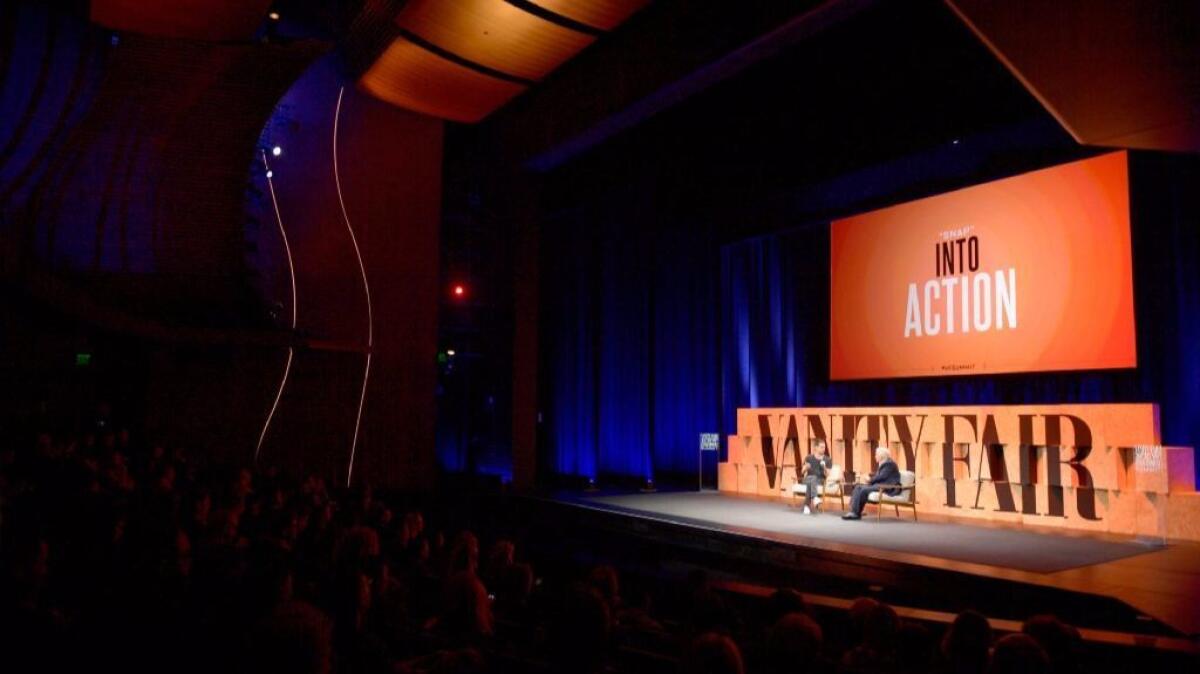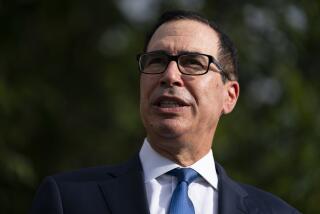Evan Spiegel defends Snap’s IPO but says he could have communicated better

Despite a shaky stock market performance, Snap Inc. co-founder and Chief Executive Evan Spiegel said he has few regrets about taking his company public this year.
“Going public was really the right thing for the company, and certainly the right thing at the time,” Spiegel said in a rare speaking appearance Tuesday in front of an audience at Vanity Fair’s New Establishment Summit in Beverly Hills.
At $14.64 apiece, Snap shares are down 46% from their all-time high after their stock market debut in March, and down 13% from the initial listing price of $17.
The 27-year-old billionaire said he could have better communicated his company’s strengths.
“One of the things I did underestimate was how much more important communication becomes,” said Spiegel, who was interviewed at the event by journalist Walter Isaacson. “When you go public you need to explain to a huge new investor base…how your business works.”
Primarily, that meant better explaining the demands of a young user base. Unlike past generations, which were intent on fitting in, Spiegel said Snapchat users are clamoring for individuality and creativity.
“If you just look back, even to my parents’ generation, businesses and advertising were all based on this idea of acceptance,” Spiegel said. “If you looked at the Marlboro man, it was about, ‘smoke these cigarettes so you can be cool.’ There’s a profound shift that’s happening right now toward empowering people to express themselves and be the best version of themselves.”
Spiegel touched on a similar theme in a Los Angeles Times interview in March, saying that he expected to spend the next five years explaining how creativity acts as a lure for Snapchat’s user base.
Spiegel made his remarks Tuesday after announcing the company was partnering with pop artist Jeff Koons on a new augmented reality feature that will allow Snapchat users to see virtual art installations around the world.
The installations, which include Koons’ signature sculptures of inflatable animals, can be viewed starting Tuesday on the Venice boardwalk, Central Park in New York and next to the Eiffel Tower in Paris, among other much-visited destinations.
News of the partnership leaked Monday after a company website featuring a countdown clock revealed the announcement a day early. Visitors had discovered they could trick the clock into thinking the countdown had expired by simply moving their computer’s clock forward.
Snap has been at the forefront of augmented reality tools, building 3D animations such as the wildly popular dancing hot dog. The animations lay over videos, or snaps, much like the company’s famous filters, which turn users’ faces into animals.
Snap has been rolling out the technology to brands and advertisers, including Bud Light and Warner Bros.
Despite that, the company’s global advertising revenue this year is not expected to be as high as previously thought, according to research firm eMarketer.
Citing competition from the Facebook-owned Instagram and the experimental nature of Snapchat, eMarketer cut its forecast to $774.1 million from $935.5 million.
Still, eMarketer expects Snap’s ad revenue to surpass Twitter’s by next year, doubling to $1.4 billion.
Spiegel also revealed on Tuesday that the company had sold more than 150,000 of its Spectacles camera sunglasses, about 50,000 more than he had expected.
He said hardware will remain part of Snap’s long-term strategy. The company let go of a dozen employees from the hardware team last month and replaced the head of the division with a deputy.
“Our view is hardware is going to be an important vehicle for delivering our customer experience, maybe in a decade,” he said. “But if we believe it’s going to be important in a decade, we don’t want to be starting a decade from now. We want to build the experience. We want to build the expertise.”
Follow me @dhpierson on Twitter








